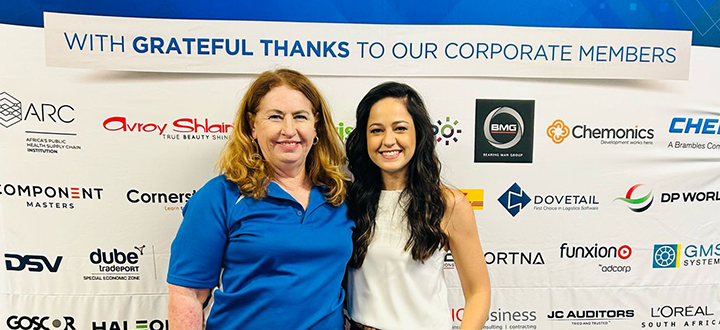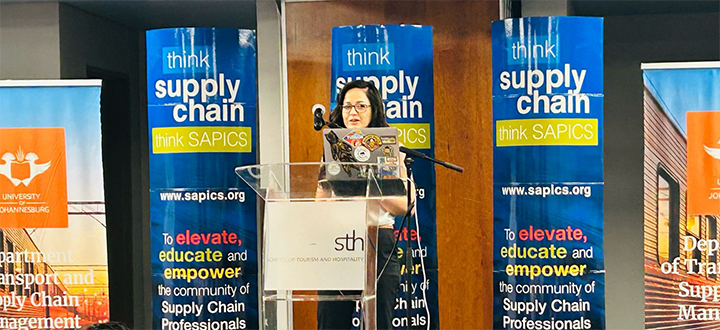News & Events
Are graduates truly industry-ready? Unisa expert tackles the soft skills gap
The South African Production and Inventory Control Society (SAPICS) held its Young Professional and Student Conference on 28 February. Dr Alicia Weber, from the Supply Chain Management section of Unisa’s Department of Applied Management in the College of Economic and Management Sciences, was invited as a speaker.

Dr Alicia Weber with Clare Fincham, Marketing Manager of SAPICS, at the SAPICS Young Professional and Student Conference
The modern workforce demands more than just technical know-how, and many graduates are stepping into the industry unprepared, according to Weber. In a compelling presentation titled Shaping Industry-Ready Graduates: Essential SCM Values for Young Professionals, she shared insights on the importance of soft skills in supply chain management, shedding light on research that reveals a worrying trend – graduates often lack the interpersonal and problem-solving skills that employers seek.
Weber and her colleague, Professor Orpha Cilliers, collaborated with SAPICS to launch a new engaged scholarship project, a series of free online mini masterclasses designed to equip students with essential soft skills through expert-led discussions.
“While technical expertise gets you in the door, it is your soft skills and values that help you build relationships, navigate challenges and create long-term success,” said Weber. Her concerns are reinforced by the findings of recent studies. In, for example, the South African Graduate Employers Association (SAGEA) Employer Benchmarking 2024, it was found that 85% of South African employers believe entry-level employees lack the necessary soft skills. Moreover, 70% of hiring managers prioritise candidates with stronger soft skills over those with superior technical abilities.
Weber recounted how this issue became a priority for Unisa’s Supply Chain Management section after the SAPICS Annual Conference in Cape Town. “The feedback from industry leaders was clear: graduates are not industry-ready,” she explained. Recognising the urgency of the situation, Weber and her colleague, Professor Orpha Cilliers, collaborated with SAPICS to launch mini masterclasses, a series of free online sessions designed to equip students with essential soft skills through expert-led discussions.

Dr Alicia Weber delivering her presentation
The initiative has already gained traction. Topics dealt with so far include personal branding, work-life balance and AI in supply chain management. “Our next mini masterclass, scheduled for 18 March, will focus on emotional intelligence in the workplace – a crucial skill for professional success,” she said. To further illustrate the value of soft skills, Weber introduced the Supply Chain Management (SCM) Framework, which encompasses three core values essential for success in supply chain management:
- Solutions-driven: Regarding this value, Weber stated: “Employers value candidates who proactively solve problems rather than just identify them.”
- Committed: In respect of this value, she noted: “Self-motivation and continuous learning are key indicators of career success.”
- Moral: Regarding this value, she remarked: “Ethical integrity in decision-making is non-negotiable in a field as critical as supply chain management.”
One of the most striking insights from Weber’s presentation was this advice for young professionals by former United States President Barack Obama: “Worry less about where you start and focus more on solving problems in your workplace.”
She continued: “If you spend just one hour a week developing this skill, by the end of the month, you'll have invested four hours. Each month, choose a new skill to focus on. By the end of the year, you'll have spent 48 hours and developed 12 new skills – all through self-discipline and without even realising it.”
Apart from benefiting students, the mini masterclasses align with the United Nations’ Sustainable Development Goals (SDGs), particularly SDG 4: Quality Education. “We are committed to cultivating industry-ready graduates and providing continuous learning opportunities that extend beyond the classroom,” she concluded.
* By Tebogo Mahlaela, Communication and Marketing Specialist, College of Economic and Management Sciences, and Letitia Marcantuono, Lecturer: Department of Applied Management, with input from ChatGPT
Publish date: 2025-04-01 00:00:00.0

